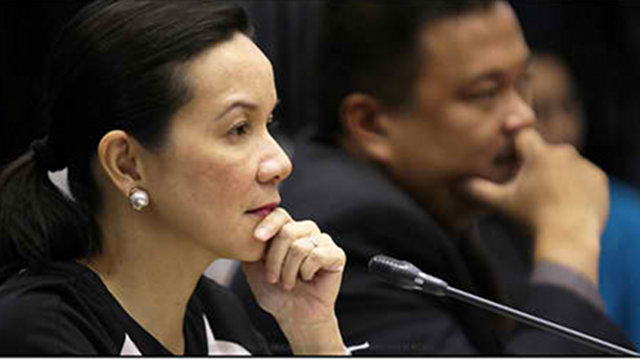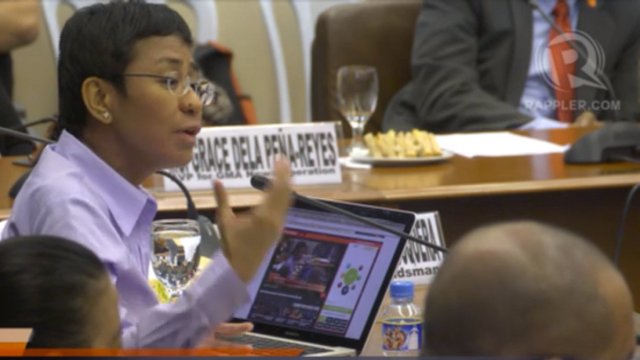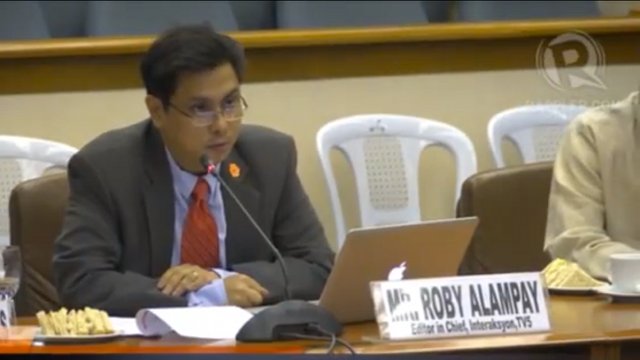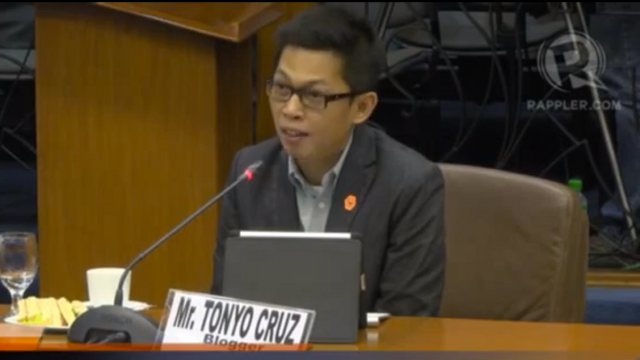SUMMARY
This is AI generated summarization, which may have errors. For context, always refer to the full article.

MANILA, Philippines – Did you know that the Freedom of Information (FOI) bill is older than Internet connection in the Philippines?
Netizens made this point as they argued for the FOI bill, which the Senate committee on public information and mass media passed on Wednesday, September 18.
During the panel’s second and final hearing on the measure, heads of TV networks and online outlets, bloggers and government officials discussed refinements needed to make the bill feasible in the time of social media. Read about the first committee hearing here.
Blogger Tonyo Cruz discussed changes in technology and the bill’s long legislative history to stress that it is long overdue.
“It is important to note that the first FOI bill filed in 1992 by Congressman Orbos antedates the Internet connection of the Philippines. Our country had our first Internet connection only in 1994,” said Cruz. “We are now a nation with over 35 million Internet-connected citizens.”
Cruz amused senators when he illustrated how long the bill has been languishing in Congress.
“[In 1992,] Ms Poe was nursing her 4-month-old firstborn son, Mr [JV] Ejercito was a new college graduate, Mr [Sonny] Angara was a business reporter …. Also in 1992, we almost had a president by the name of Miriam Defensor Santiago. Ganoon na po katagal.” (It’s been that long.)
Poe said the committee will work on the details on how government agencies will comply with the bill given technological considerations.
She said the committee will reconcile the 11 bills into one committee report by September 23 and then she will sponsor this on September 25. Poe said the chamber will approve the bill within the year.
The FOI bill aims to institutionalize the right to know and policy of public disclosure enshrined in the Constitution by providing a system for ordinary citizens to access government documents and information.

’15 days is generation in time of online news’
Rappler CEO and Executive Editor Maria Ressa made the following suggestions to ensure that the FOI bill will ensure the use of technology to promote transparency:
1. Not to limit requests for information to Filipino citizens given routine government transactions with foreigners
2. To clarify and distinguish between FOI requests and those made under the Data Privacy Act. The information subject to a Data Privacy Request is directed to the individual while an FOI disclosure is addressed to the public in general
3. To strengthen the language of the law by stating that the person requesting should not be required to provide a reason for the request nor the request be denied for failing to provide any reason
4. To clarify the “reasonable time” exception in the law. The exception is poorly worded and the agency is free to interpret the meaning of the phrase
5. To direct the appeal of a denial of request to the Court of Appeals because the head of agency suffers from conflict of interest, having to choose between a subordinate and a private citizen
6. To impose criminal liability for non-compliance
Like journalists in the first hearing, Ressa said the 15-day period for granting FOI requests was too long for journalists on deadline.
“Fifteen days in the time of online news is a generation, a lifetime. We suggest that journalists and news organizations not be subjected to the 15-day waiting period.”
Ressa and Interaksyon Editor-in-Chief Roby Alampay said that information must not only be accessible but also usable. Interaksyon is the online news portal of TV5.
Alampay suggested that the bill define the usability of data to avoid a “simplistic and glib” manner of granting FOI requests.
“There was a lot of interest on the [Senate] testimony of Benhur Luy. People were waiting for the transcript, when it was uploaded, uploaded not only in PDF format, it was a printout scanned and then converted into PDF. The reality is you’re given a transcript that is not something easily usable for any layman. Most people want to use that document with a tool as easy as Word,” Alampay said.
Committee Chairman Grace Poe said her panel will be careful in defining terms because of drastic changes in technology. She said there is also a danger in being too specific in the bill.
“We need to have the proper wording in such a way that we will enable government agencies to be compliant with the demands of the time …. The PDF format may be obsolete tomorrow,” she said.

‘Abuse of freedom’ in social media
Sen JV Ejercito, one of the authors of the bill, said fellow lawmakers expressed concern about the “abuse of freedom” in social media that may result from the passage of the bill.
Cruz responded, “I don’t predict there will be abuse because there are procedures laid out.”
Cruz also offered the expertise of netizens in digitizing government records, setting up websites, making apps, and using cyberspace to ensure transparent governance.
Poe said she will take him up on his offer
“Nobody can really regulate the Internet. It’s too vast. It’s like trying to regulate the solar system,” Poe said in response.

Certify urgent, not just priority
Assistant Secretary Jess Anthony Yu of the Presidential Communication Operations Office reiterated that the FOI bill will be part of the bills the Palace will present to the Legislative-Executive Development Advisory Council (LEDAC), signifying that it will be a priority of the President.
Former Quezon Rep Erin Tañada, an FOI champion in past Congresses, welcomed this. “We’re happy that the FOI is part of the agenda in the coming LEDAC meeting. This is the first time it’s part of the agenda. We are hoping for a strong push.”
For Ejercito though, the President can do more to push the bill, especially in the House of Representatives where it has traditionally met opposition.
“I know this will be the battleground, the House. If the President certifies this bill as urgent or one of their measures in their wish list, I don’t think we will have a problem in passing [it].”
Poe had a different opinion on asking the President to certify the bill urgent.
“I will defer to the judgment of the President. He sees the whole view of what’s happening in the country.” – Rappler.com
Add a comment
How does this make you feel?
There are no comments yet. Add your comment to start the conversation.